
“The most attractive thing in research is that you know exactly what questions you are asking, but you have no idea what answers you will find, nor what other questions will emerge in the process. I was researching to develop a tool that would improve enforcement of competition law, and I have discovered how this tool was curing our economy from possible diseases day-by-day. Antitrust settlements need to be protagonists and deserve attention from the entire community of economists, not only the minority antitrust one.” Antitrust Settlements-How a Simple Agreement Can Drive the Economy (Wolters Kluwer, 2019)
Speaker, 2024 Stigler Antitrust and Competition Conference – Antitrust, Regulation and the Diffusion of Innovation, “Case Studies: AT&T & IBM” (Apr. 18, 2024), University of Chicago Booth School of Business
Recording available at: https://www.youtube.com/watch?v=2VNivXjrU3A
My article on the AT&T and IBM cases, Driving Innovation with Antitrust, ProMarket (Apri. 10, 2024) is available at: https://www.promarket.org/2024/04/10/driving-innovation-with-antitrust/


Co-organizer and Moderator, JLI 7th Annual Symposium “Antitrust at a Crossroads: The Challenge of Digital Platforms” (Feb. 2, 2024), Penn Carey Law
Recording available at: https://www.youtube.com/watch?v=RT6DbJZNBtY

Presenter, Proposing a Computer Science Approach to Antitrust, Weizenbaum Institute, Platforms, Markets, and the Digital Society (Dec. 14, 2023)
Panelist, Cloud/AI/Privacy: Legal Trends and Implications, American Bar Association (Oct. 26, 2023)
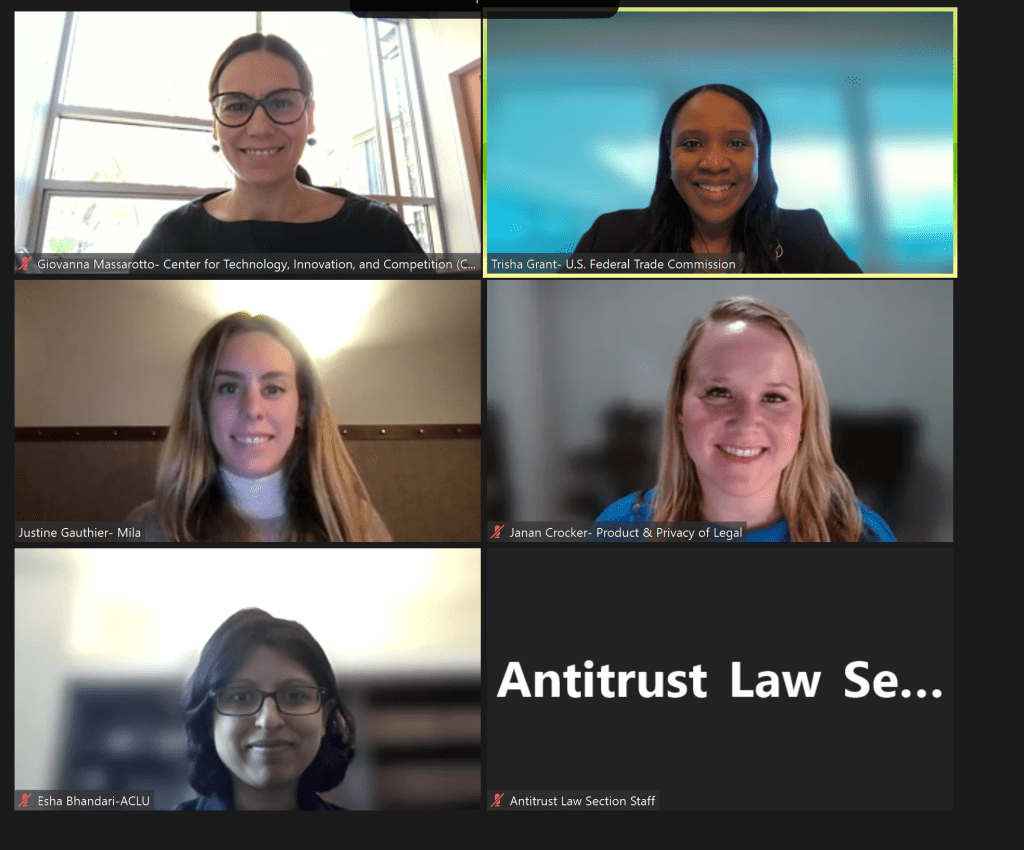
Presenter, A Computer Science Approach to Cartel Agreements: The Case of Cheat Tolerant Cartels, Computer Science and Law Roundtable, University of Pennsylvania Carey Law, Philadelphia (May 23, 2023)
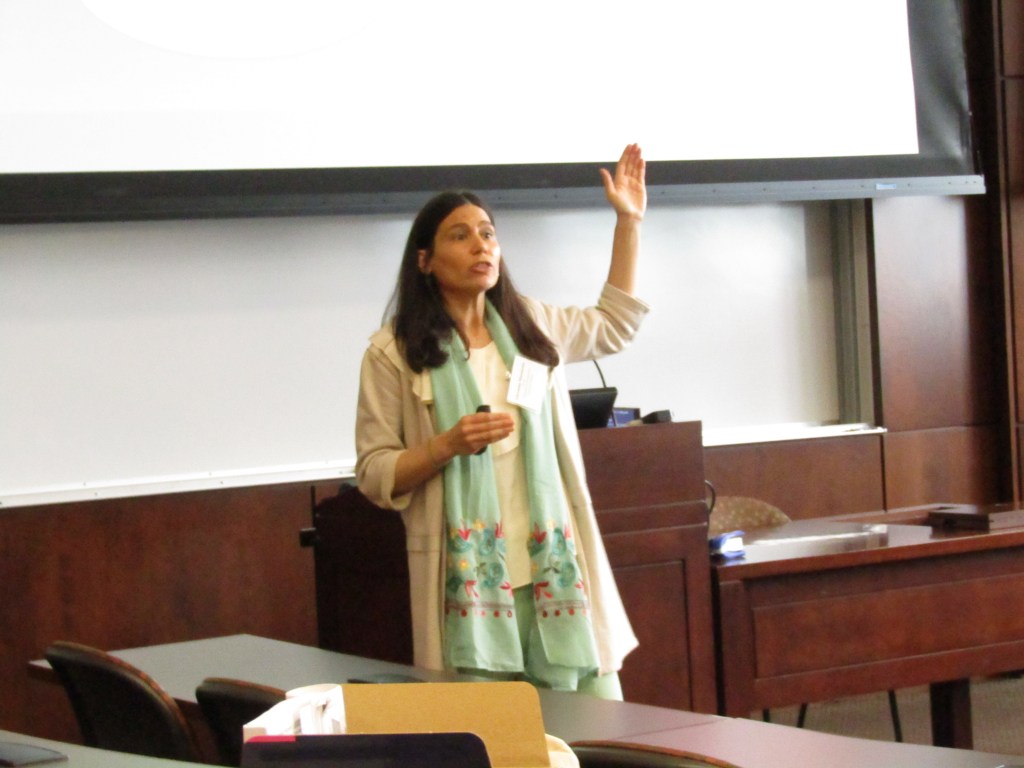
Presenter, A Computer Science Approach to Cartel Agreements: The Case of Cheat Tolerant
Cartels, LawTech Consortium, McGill University, Montreal (May 14, 2023)
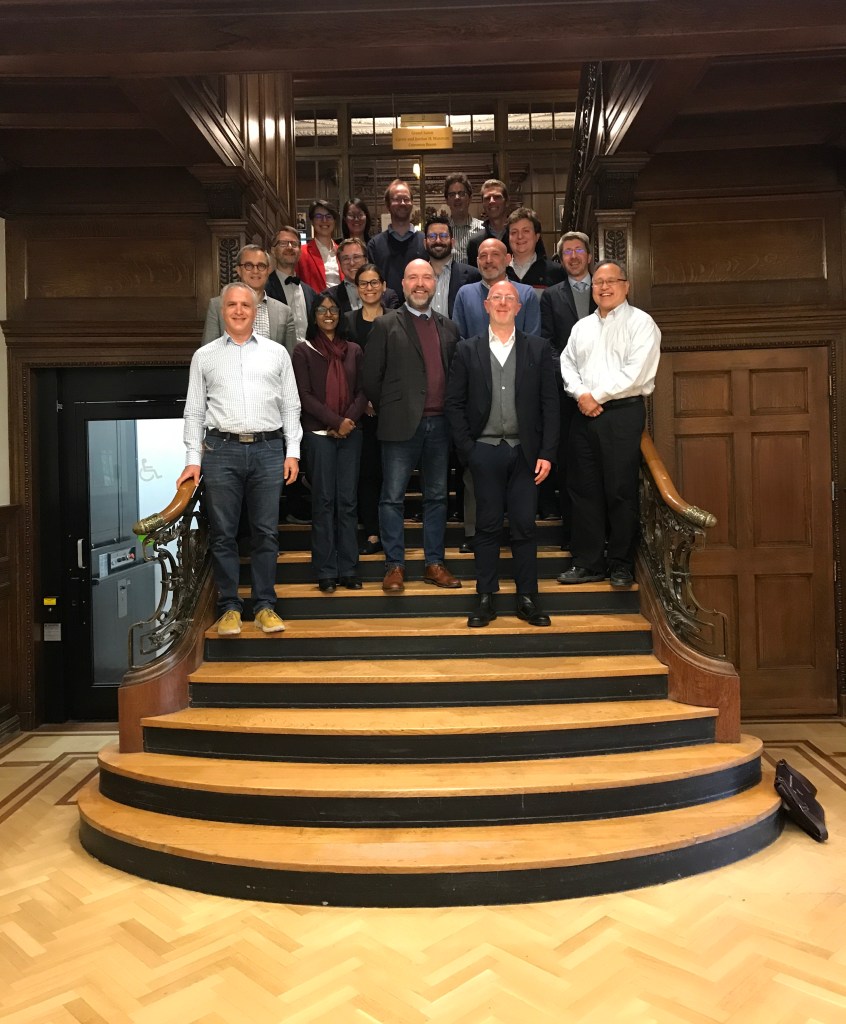
Speaker, CMU Blockchain Security Summit, Tepper School of Business Carnegie Mellon University, May 9, 2023
Speaker on the policy panel with Leemon Baird, Michael Madison and Ariel Zetlin-Jones. https://www.cylab.cmu.edu/research/blockchain/secure-blockchain-summit.html
Recording available at: https://youtu.be/lMRysGsbabs?si=nGKqJ6mTk-rm7-3S
Moderator, Panel 2 – The Antitrust Backlash Against Big Tech, World Trends in Competition Law and Policy Symposium, Penn Carey Law, April 7, 2023
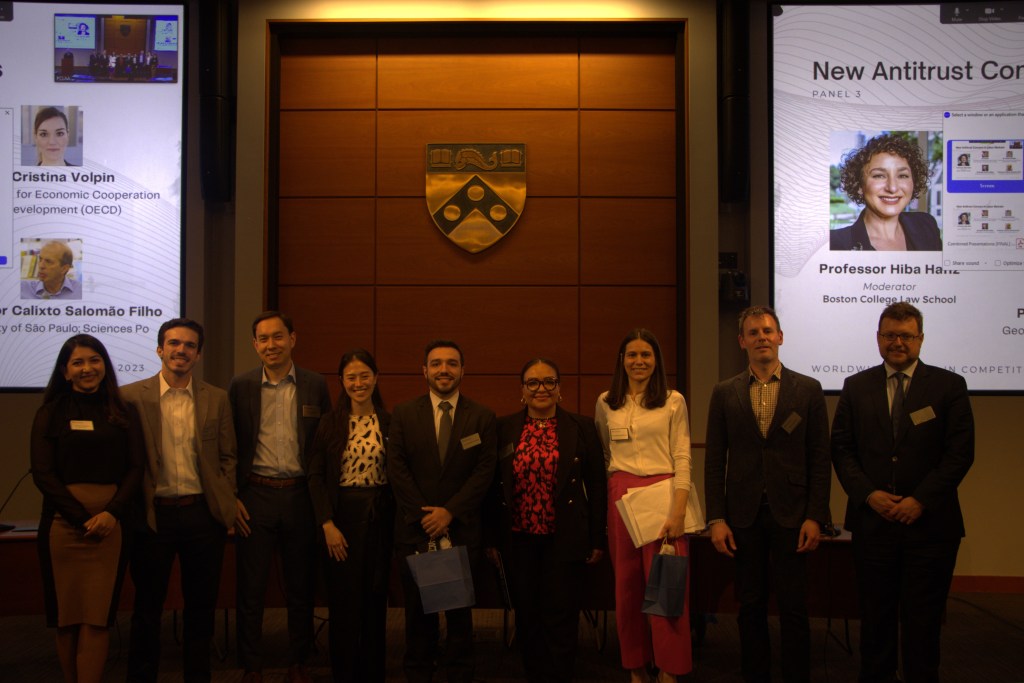
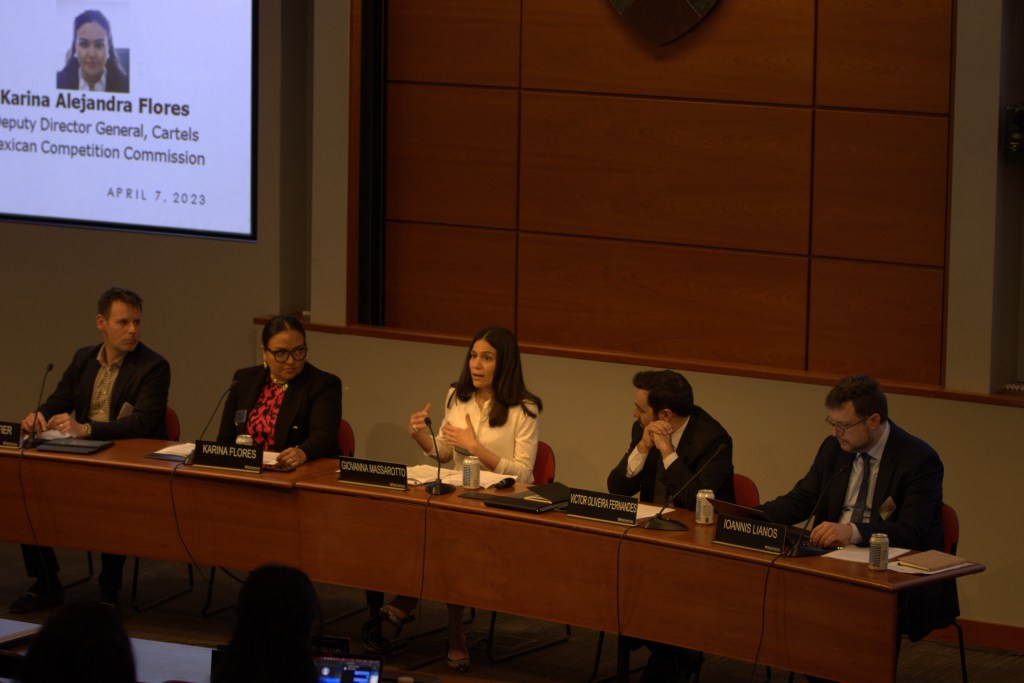
Recording available at: https://scholarship.law.upenn.edu/plaa/2023/all_presentations/6/
Moderator, Digital Assets and International Considerations panel, Digital Assets and Cryptocurrencies Symposium, Penn Carey Law, Feb. 17, 2023
Moderated the “Digital Assets and International Considerations panel” focused on an international overview of digital assets regulation, CBDC and questions like “Is code law?” with Prof. Eva Micheler, Ananya Kumar and Jenn Lassiter. https://www.law.upenn.edu/calendar/event/67431-symposium-journal-of-business-law-and-journal-of
Online Book Launch: “Algorithmic Antitrust” (Springer), Feb. 24, 2022
Presented “Can Antitrust Trust Blockchain?”, chapter of the book Algorithmic Antitrust (Springer, 2022).
Chapter available at https://link.springer.com/chapter/10.1007/978-3-030-85859-9_6
Recording available at https://itif.org/events/2022/02/24/book-launch-algorithmic-antitrust/
European University Institute (EUI), Presented “Using Blockchain-based Smart Contracts to Enforce the Antitrust Consent”, Feb. 10, 2022
Antitrust jurisdictions all over the world are looking at new rules for digital markets to manage possible forms of monopolization because the consumer welfare standard would be ill-adapted to ensure competition in digital platforms. This paper proposes a different solution by exploring a blockchain system and blockchain-based smart contracts to enforce antitrust remedies enshrined in an antitrust consent solution and make the antitrust enforcement more efficient through a technologically managed solution. Antitrust cannot act in isolation to resolve the new antitrust paradox that is targeting digital markets internationally. The globalization of antitrust law is a long-term goal in which blockchain can be an invaluable asset.
Paper available at https://papers.ssrn.com/sol3/papers.cfm?abstract_id=4016740
Speaker at GCR Law Leaders Global, Miami, Jan. 28, 2022
Speaker on the closing plenary panel with Pierre Régibeau, Chief Competition Economist, DG Competition, European Commission, Brussels; Luigi Zingales, Robert C. McCormack Distinguished Service Professor of Entrepreneurship and Finance and George G. Rinder Faculty Fellow, University of Chicago, Chicago; Benedict Evans, Independent Analyst, London and Margaret Sanderson, Charles River Associates, Toronto on Jan. 28, 2022.
Program available at https://events.globalcompetitionreview.com/event/f647e34b-8cf5-4978-bdf0-08abdb26ef24/websitePage:645d57e4-75eb-4769-b2c0-f201a0bfc6ce?RefId=gcreventslisting
Stanford Computational Antitrust: Exploring Antitrust 3.0, Presented “Gleaning Insight from Antitrust Cases Using Machine Learning”, Dec. 14, 2021
Presented “Gleaning Insight from Antitrust Cases Using Machine Learning” at Computational Antitrust conference a Codex, Stanford. Prof. Ittoo and I presented our experiment concerning the adoption of AI techniques to detect useful patters in the antitrust enforcement action of the Federal Trade Commission (FTC).
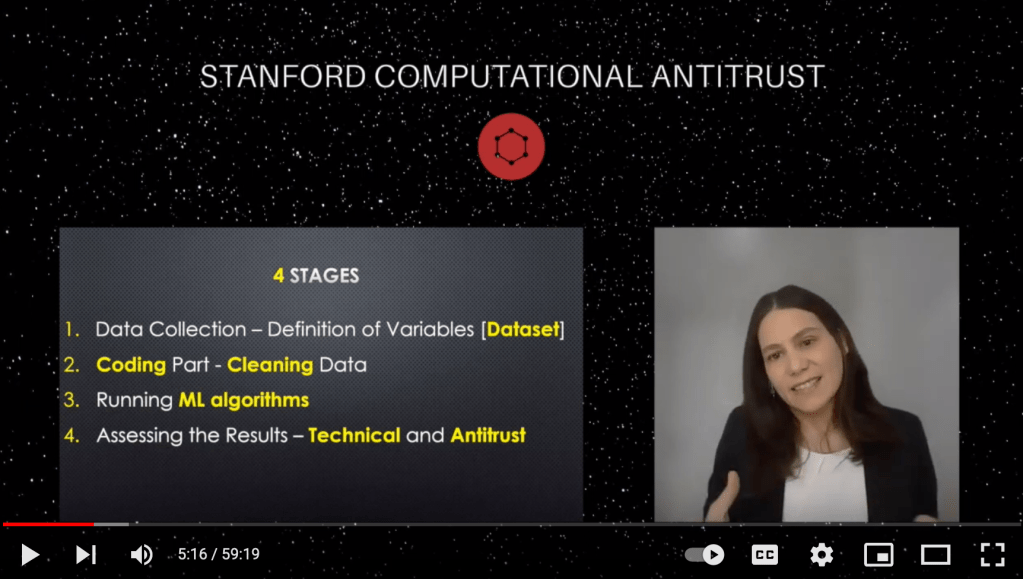
Conference Agenda https://conferences.law.stanford.edu/computational-antitrust-exploring-antitrust/agenda/
Recording available at https://www.youtube.com/watch?v=ooTEB9ydQfc
CUTS Institute for Regulation & Competition, Speaker, Lectured on Blockchain and Competition, Nov. 22, 2021
Invited to lecture on Blockchain and Competition at CUTS Institute for Regulation & Competition (“CIRC”) Winter School on November 22sd. The Winter School represents the first comprehensive effort in India initiated by CIRC to enhance the understanding of Competition Law in India and other developing countries.
More information available at https://circ.in/winter-school/#
Speaker, Competition Around the Globe and Beyond, Penn Carey Law, Oct. 29, 2021
Speaker on the “Algorithms, artificial intelligence and antitrust” panel with Prof. Christopher Yoo and Thibault Schrepel. My focus was on whether technologies are ruling markets: https://www.law.upenn.edu/live/news/14122-ctic-academic-fellow-giovanna-massarotto-explores
The Stanford Center for Legal Informatics, Codex, Presented “Big-Tech – Flipping the Mindset From Antitrust Threat to Opportunity”, Aug. 26, 2021
Antitrust enforcement action is in the spotlight because today’s most valuable markets—digital markets—are in the hands of a few corporations—Big tech. But, it is unclear what antitrust remedies would be feasible and effective in this new environment. This research project tackles this issue by investigating the most appropriate antitrust remedies in the context of the innovation process through the exploitation of AI and blockchain technologies. For more information https://law.stanford.edu/2021/08/24/codex-meeting-august-26th-2021/.
Recording available at Codex Weekly Meeting – August 26, 2021
Guest Speaker UZH Deep Dive into Blockchain, July 19, 2021
Presented Blockchain and/for Antitrust at the UZH International Summer School “Deep Dive into Blockchain” online. Blockchain can be the ideal tool to enforce antitrust principles in today fast moving technological markets. On the other hand, blockchain needs antitrust to prevent anticompetitive practices that can jeopardize the key component of blockchain–decentralization. For more information, UZH International Summer Schools: Deep Dive into Blockchain.
Stanford Computational Antitrust, Episode 1: Gleaning Insight from Antitrust Cases Using Machine Learning (Massarotto & Ittoo), Mar. 5, 2021
Prof. Ittoo and I discussed our work “Gleaning Insight from Antitrust Cases Using Machine Learning”, which describes an AI system we built to assist antitrust agencies in their enforcement actions. Our AI application shows much promise from the use of AI in the antitrust domain.
The interview is available at https://www.youtube.com/watch?v=aT0xZxgBWdg&t=18s
Speaker at OECD Blockchain Policy Forum, Nov. 14, 2020
Discussed blockchain and/for competition policy in the panel “Blockchain & Competition Policy” with representatives from the DOJ, EU Commission, OECD and l’Autorité de la concurrence. https://oecd-events.org/blockchainforum%20/session/30e0bb6e-44e9-ea11-8b03-000d3a217408 . This talk centred on how blockchain can be an ideal antitrust enforcement tool if antitrust principles are ensured in the same blockchain markets. See “Is Blockchain the Real Antitrust Game Changer? (CPI, 2020).”
Programme Coordinator of the “Blockchain Rules” Executive Online Programme for UCL Centre for Blockchain Technologies (UCL CBT)
This Blockchain Executive Education Online Programme led by Dr. Giovanna Massarotto brings the world-renowned expertise of the UCL Centre for Blockchain Technologies (UCL CBT) for government officers, managers, legal professions, accountants and engineers interested in studying the foundations of the rules that govern today’s digital economy with a focus on blockchain technologies.
For more information http://blockchain.cs.ucl.ac.uk/blockchain-rules-online-programme/
UCL CBT Series of Interviews on Technologies & Policy
This series of interviews designed and run by Dr. Giovanna Massarotto for UCL CBT aims to investigate the relation between policy and technology (with a focus on blockchain) among professionals, government officials and business managers https://soundcloud.com/eduard-oboimov/interview-with-professor-kevin-werbach-forblockchain-rules-podcast-series .
This series of interviews/podcast is based on the UCL CBT Executive online programme “Blockchain Rules”. For more information https://cykubeacademy.com/ , http://blockchain.cs.ucl.ac.uk/blockchain-rules-online-programme/ .
Book Launch & UCL CBT Seminar – November 26th
Lecture on Giovanna Massarotto’s new book titled “Antitrust Settlements: How a Simple Agreement Can Drive the Economy”
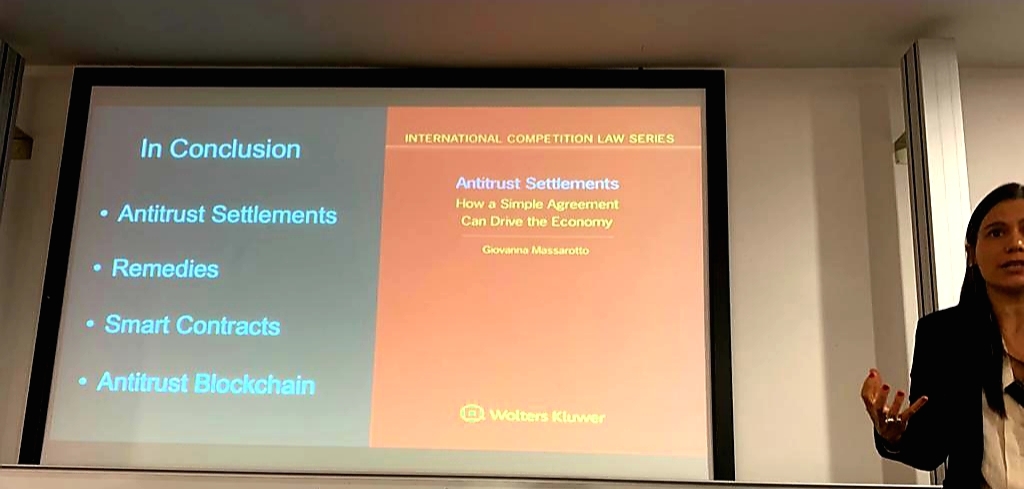
As a PhD in law, what first struck me was how a simple agreement (which in my mind was a contract) could regulate markets and drive our economy by changing the dynamics of markets. In 1956 an antitrust settlement set the tone for the creation of the Internet. Today antitrust settlements along with unlocking the complexity of blockchain technology and smart contracts can be the key to govern present and future data-driven markets. Antitrust settlement is not a mere tool to enforce antitrust law, and this book is not merely a book on antitrust settlements. This book is a springboard to further investigate how a simple antitrust enforcement tool can drive our economy leading both the antitrust and regulatory intervention in today’s global data economy.
This event has taken place at the Sir Ambrose Fleming LT, G06, Roberts Building, Gower Street, London, WC1E 6BT.
Online Seminar UCL Centre for Blockchain Technologies(UCL CBT), May 28, 2020
Antitrust in the Blockchain Era
Abstract: Similar to the Internet Era, which generated new value chains based on digital marketplaces, the blockchain has the potential to be the next cutting-edge technology which will revolutionize markets. Blockchain technology built on a consensus mechanism can make intermediaries [or third parties] unnecessary and reduce the market power of today’s centralized platforms. Antitrust enforcers should oversee the transformation of digital markets by means of blockchain technology to prevent anticompetitive conduct that might block the path to innovation. Using the Web as a model of reference, a public blockchain could run on universal and open protocols; with goods and services traded in a single universal blockchain. Antitrust enforcers are fundamental in keeping blockchain markets open and free. Rather than leading to the death of antitrust and regulation, blockchain will require more sophisticated versions of both.
Presentation of my paper “Antitrust in the Blockchain Era” available at https://papers.ssrn.com/sol3/papers.cfm?abstract_id=3548094
To attend register here https://www.eventbrite.com/e/ucl-cbt-monthly-online-seminars-tickets-103247114900
Lecture on Data Economy and Law/Antitrust at Politecnico of Milan on March 5, 2020
Discussed the role of law (e.g. antitrust and economic regulation) in today’s data economy. The exploitation of innovative technologies (e.g. blockchain) has also been debated. Online lecture. For more information https://www.som.polimi.it/event/presentazione-executive-mba-05032020/
Distinguished Guest Scholar for the Global Antitrust Institute. Washington D.C. – February 20-27, 2020.
Invited to serve as a Distinguished Guest Scholar for the Global Antitrust Institute (GAI) and the Global Antitrust Law & Economics LLM Program at the Antonin Scalia Law School of George Mason University in Washington DC.
https://gai.gmu.edu/distinguished-guest-scholars/
Lecture on February 26, 2020
Grasping the Meaning of Big-Tech Antitrust Consent
Brief Synopsis:
Big-tech has put antitrust in the spotlight. Data-driven markets are increasingly dynamic and unpredictable, making the enforcement of antitrust challenging. Some scholars suggested that antitrust should simply be abolished as historically it has done more harm than good. Paradoxically, a globally enforced consent solution (antitrust settlement) that exploits the same big-tech ingenuity has enormous potential to secure economic democracy by delivering innovation through a technologically managed solution.
at Antonin Scalia Law School https://gai.gmu.edu/
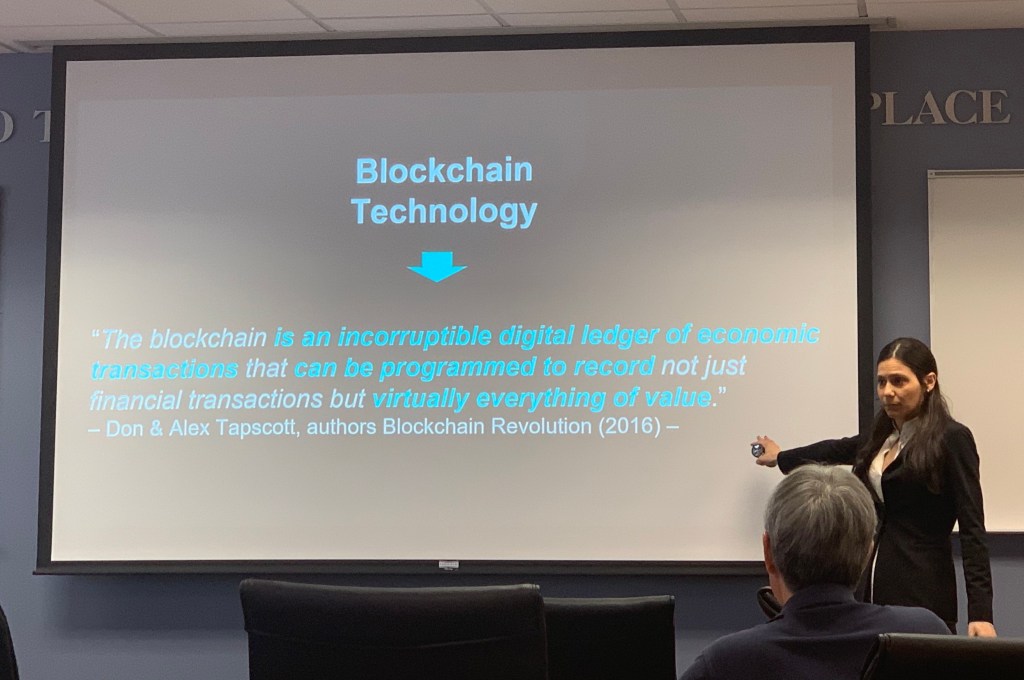
Seminar at the Centre for Competition Law and Policy (CCLP). University of Oxford – February 7, 2020.
This seminar focused on the critical issues related to data industry regulation and the crucial role of antitrust consent in driving the regulation process forward. Entitled:
Is the Antitrust Consent the Solution to Tackle Today’s Data-Driven Markets?
ABSTRACT – Since the origin of antitrust law, academic lawyers and economists have criticized antitrust enforcers for their inactivity or alternatively their excessive zeal. Today the situation has not actually changed. In the U.S., some antitrust scholars called it a ‘paradox’ as the enforcement of antitrust principles seem to be ever more challenging. Data-driven markets are increasingly dynamic and unpredictable, and ‘no action’ seems an all too common solution. Could the Antitrust Consent be the key? This alternative approach will be presented and debated.
https://www.law.ox.ac.uk/events/antitrust-consent-solution-tackle-todays-data-driven-markets
Seminar at Competition and Markets Authority (CMA). London – February 6, 2020.
This seminar covered Part III of my book focused on the Antitrust Consent Regulation in data-driven markets and is entitled:
Could (or Should) the Antitrust Consent Govern Data-Driven Markets?
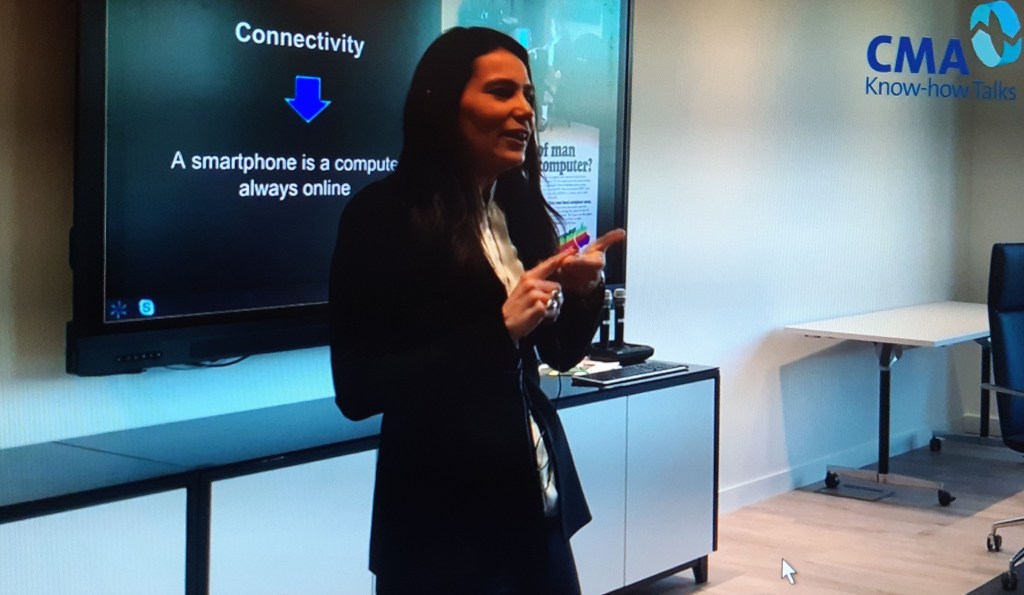
IT Law Certificate Program – H-FARM
Taught 3 Days intensive course in IT Law (from software to blockchain) to economists, legal professions and engineers to increase their ability to manage legal issues related to IT and to be proactive with daily IT challenges in their current or future profession.

Dec. 12, 13, 14, 2019
H-FARM Roncade (IT) https://www.h-farm.com/en/education/college/short-programs/law-information-technology-certificate-program